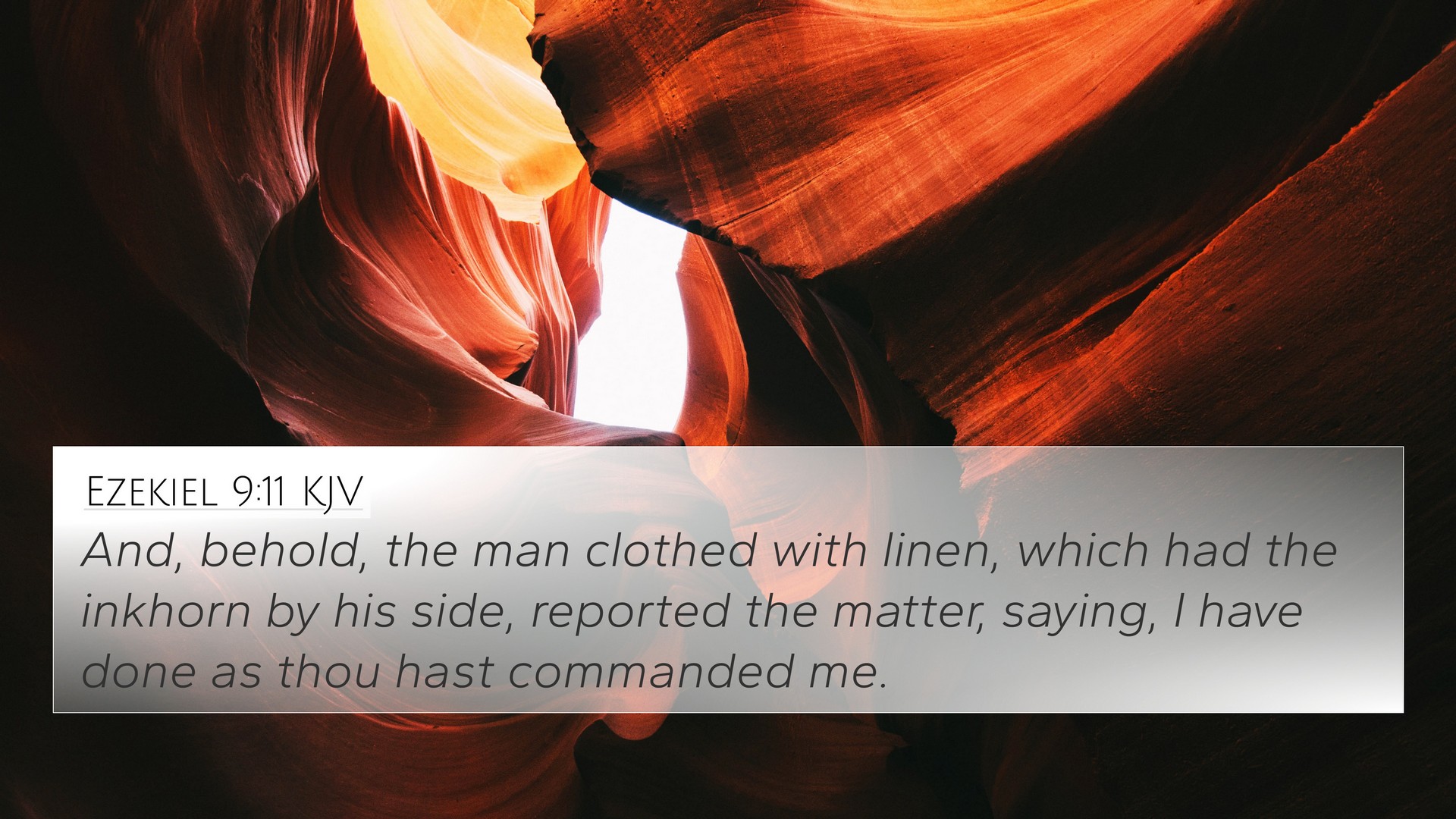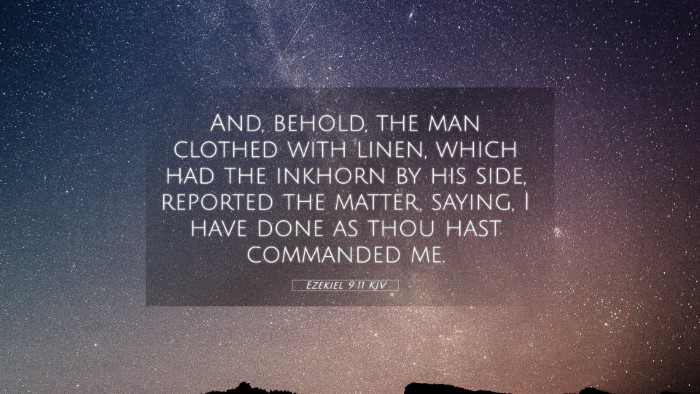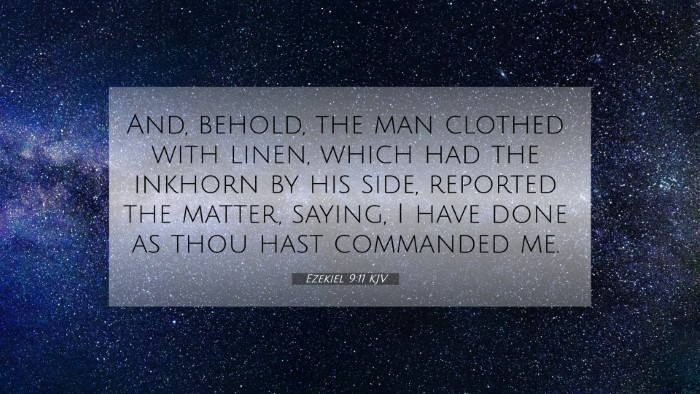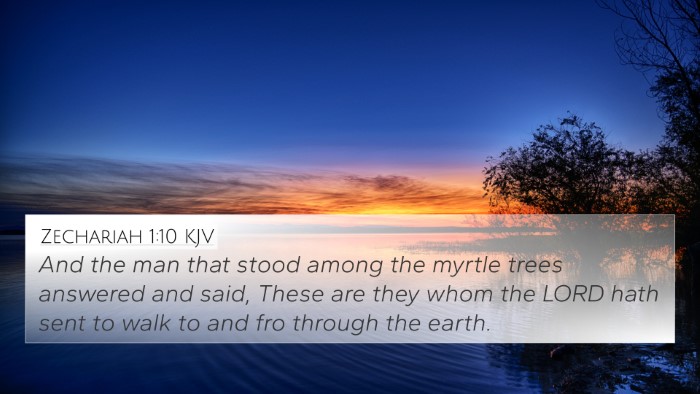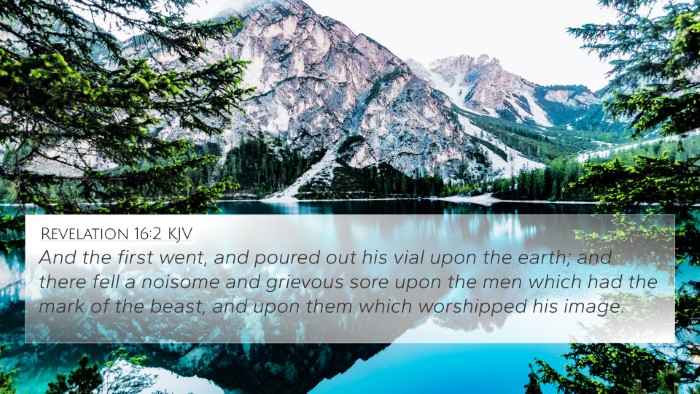Ezekiel 9:11 - Verse Meaning and Interpretation
Ezekiel 9:11 states: "And, behold, the man clothed with linen, which had the inkhorn by his side, reported the matter, saying, I have done as thou hast commanded me." This verse serves as a critical moment within the prophetic revelations of Ezekiel, depicting divine judgment and mercy in the context of Israel's transgressions.
Summary of Insights
This verse is part of a vision where God’s judgment is being executed upon Jerusalem for its idolatry and wickedness. The man in linen represents a divine messenger responsible for marking those who are faithful to God, thus distinguishing them from the rest of the people who are to face judgment. The task is completing God's command to protect those who mourn for the sins of the city.
Commentary Insights
-
Matthew Henry's Commentary:
Henry points out the gravity of God’s judgment that is being portrayed, emphasizing how the messenger's reporting back signifies the fulfilment of God’s orders. The linen symbolizes purity, and the inkhorn indicates the regulation of who is to be spared during the impending destruction.
-
Albert Barnes' Commentary:
Barnes highlights the readiness and obedience of the messenger, illustrating the principle of God's clear communication and divine order. This messenger acts swiftly, underscoring the urgency of divine judgment and the need for followers to remain vigilant and faithful.
-
Adam Clarke's Commentary:
Clarke provides details on how the marking of the faithful followers serves as a protective measure. He correlates the inkhorn’s purpose with ancient practices of inventorying and preservation, suggesting that God marks those who would be redeemed and preserved through the judgment.
Thematic Connections
The themes of judgment and mercy repeatedly appear throughout the book of Ezekiel and the Bible as a whole. This verse particularly connects to other significant passages which reflect divine judgment upon a sinful nation and the preservation of the righteous.
Bible Verse Cross-References
Here are some relevant Bible verses that interconnect with Ezekiel 9:11, highlighting similar themes:
- Ezekiel 8:17-18: Discusses Israel’s abominations leading to God’s anger.
- Ezekiel 18:30: Calls for repentance among the people of Israel.
- Revelation 7:3: The sealing of God's servants parallels the marking done in Ezekiel.
- Romans 11:4: Paul refers to the remnant of faithful believers, reminiscent of those marked by the messenger.
- Isaiah 26:20: A call for the people to enter their chambers of safety during judgment.
- Matthew 24:31: The gathering of the elect during the Lord’s return reflects a similar protective action.
- 1 Peter 4:17: Points out that judgment begins at the house of God, connecting to the themes in Ezekiel.
Understanding through Cross-References
When engaging with Ezekiel 9:11, one can utilize cross-referencing and thematic Bible study methods to uncover deeper meanings:
- Identifying connections between the Old Testament and New Testament enhances understanding of God's consistent nature regarding justice and mercy.
- Comparative Bible verse analysis can provide clarity on the role of divine messengers and their purpose throughout scripture.
Tools for Cross-Referencing
Several resources can aid in a deeper study of Bible verses related to Ezekiel 9:11:
- Bible concordances help in locating similar verses across the scriptures.
- Bible cross-reference guides outline connections between passages effectively.
- Cross-reference systems can define the relationships crucial for understanding prophetic writings.
- Bible reference resources such as study Bibles and online databases provide extensive insights into thematic connections.
Conclusion
The study of Ezekiel 9:11 unveils the depth of God's judgment tempered by His grace, as exemplified in the marking of the faithful. Understanding this verse within its broader context encourages believers to reflect on their own faithfulness amidst a world fraught with challenges to God's commandments. With the aid of cross-referencing, one can draw enriching parallels and insights that speak to God’s continuous engagement with humanity.
